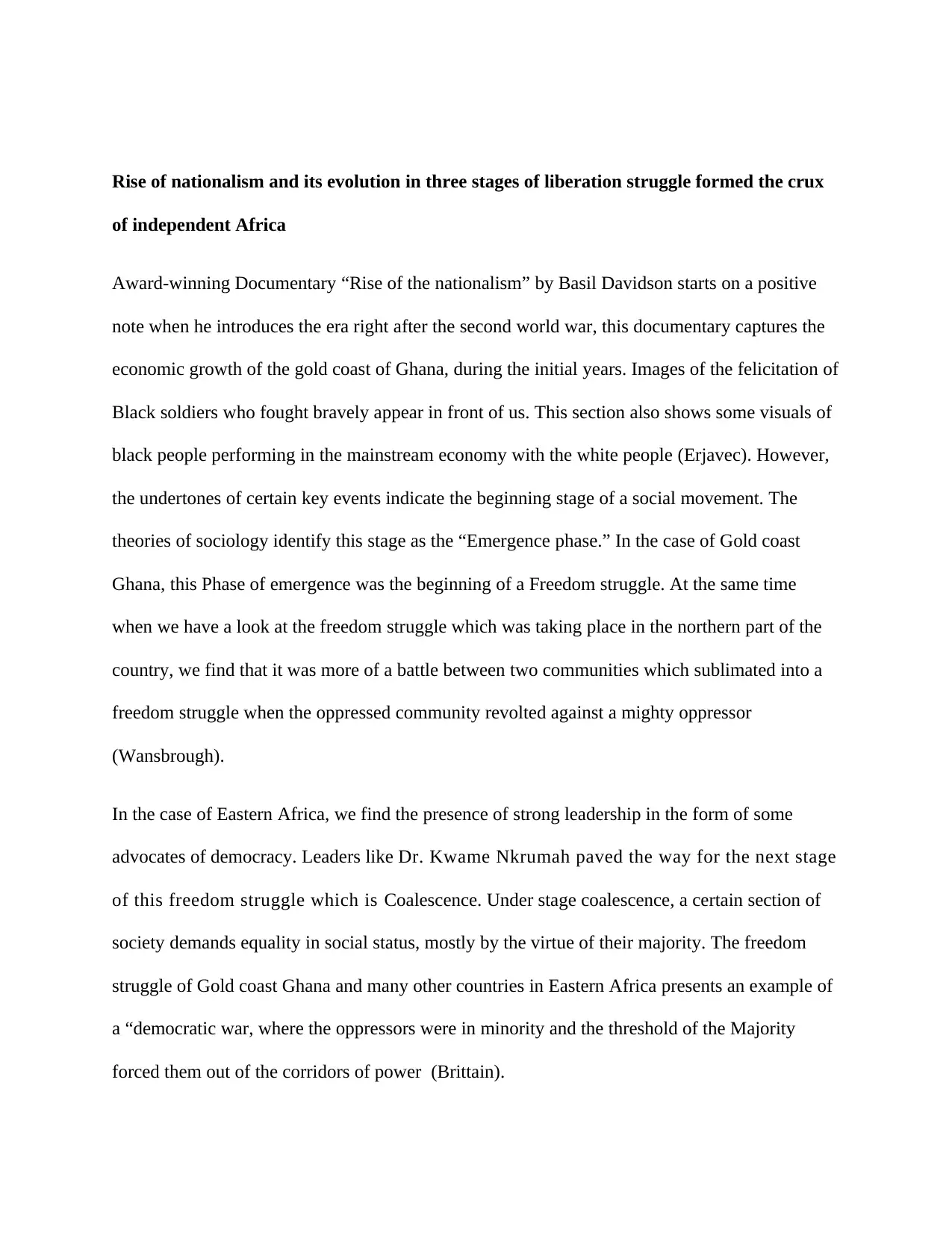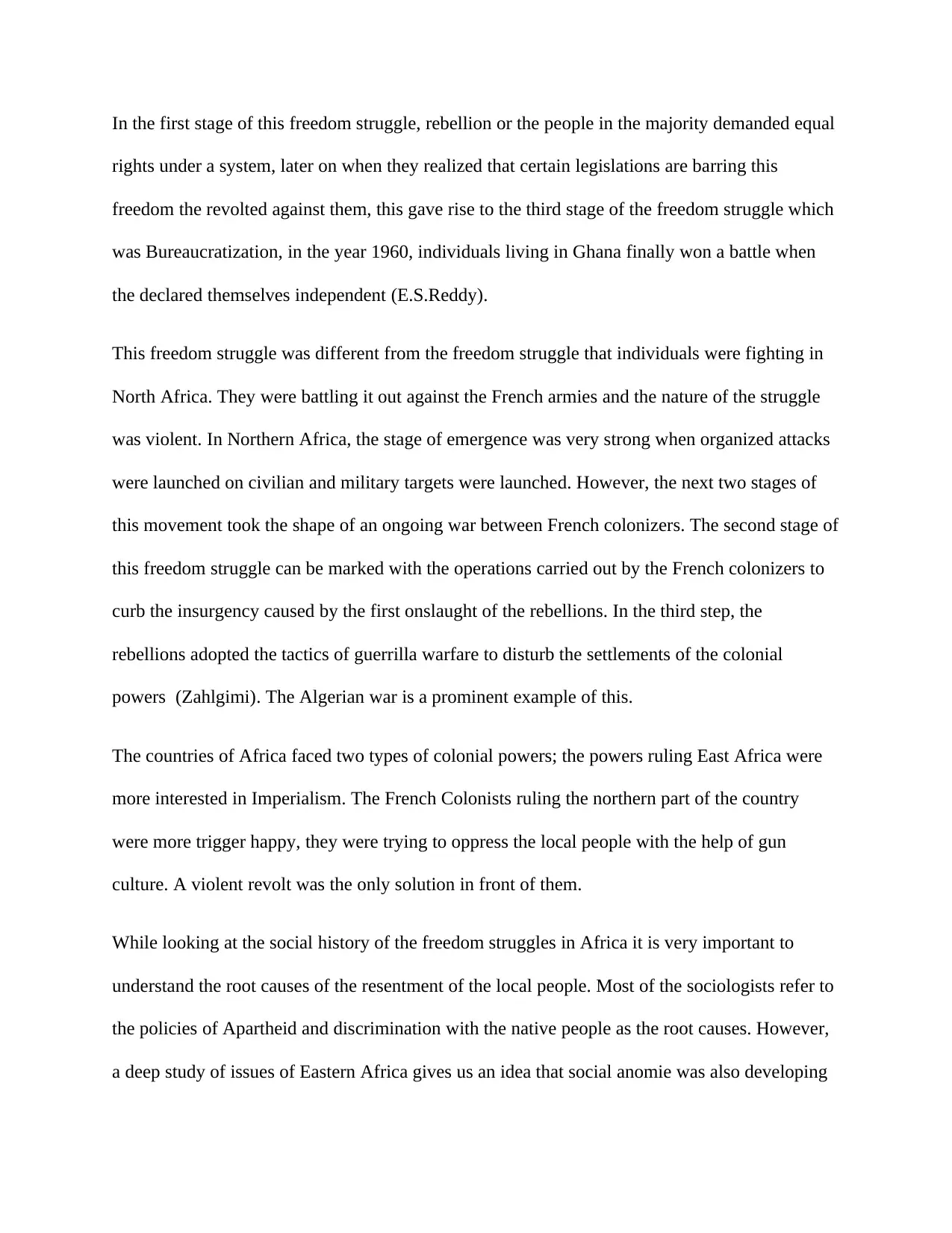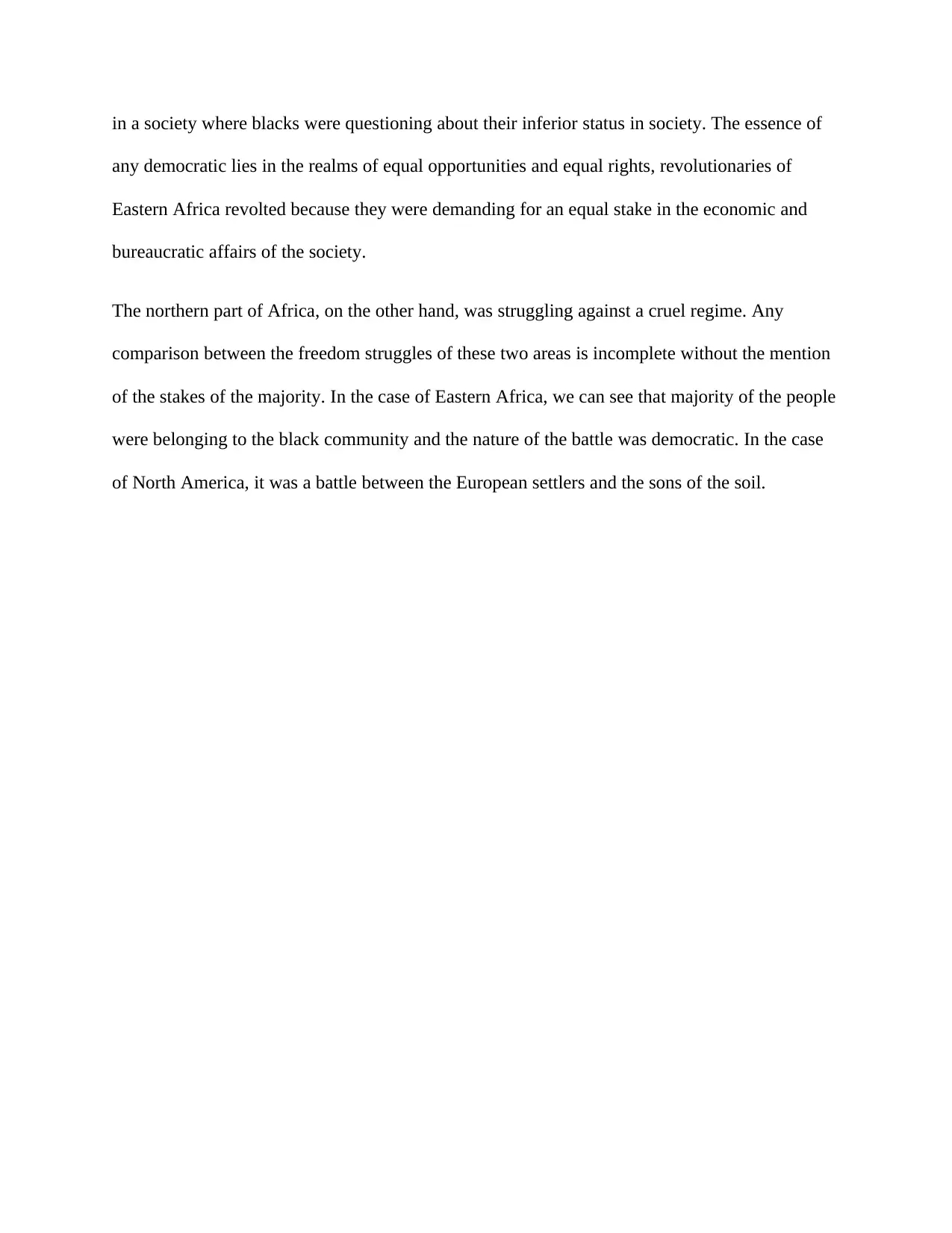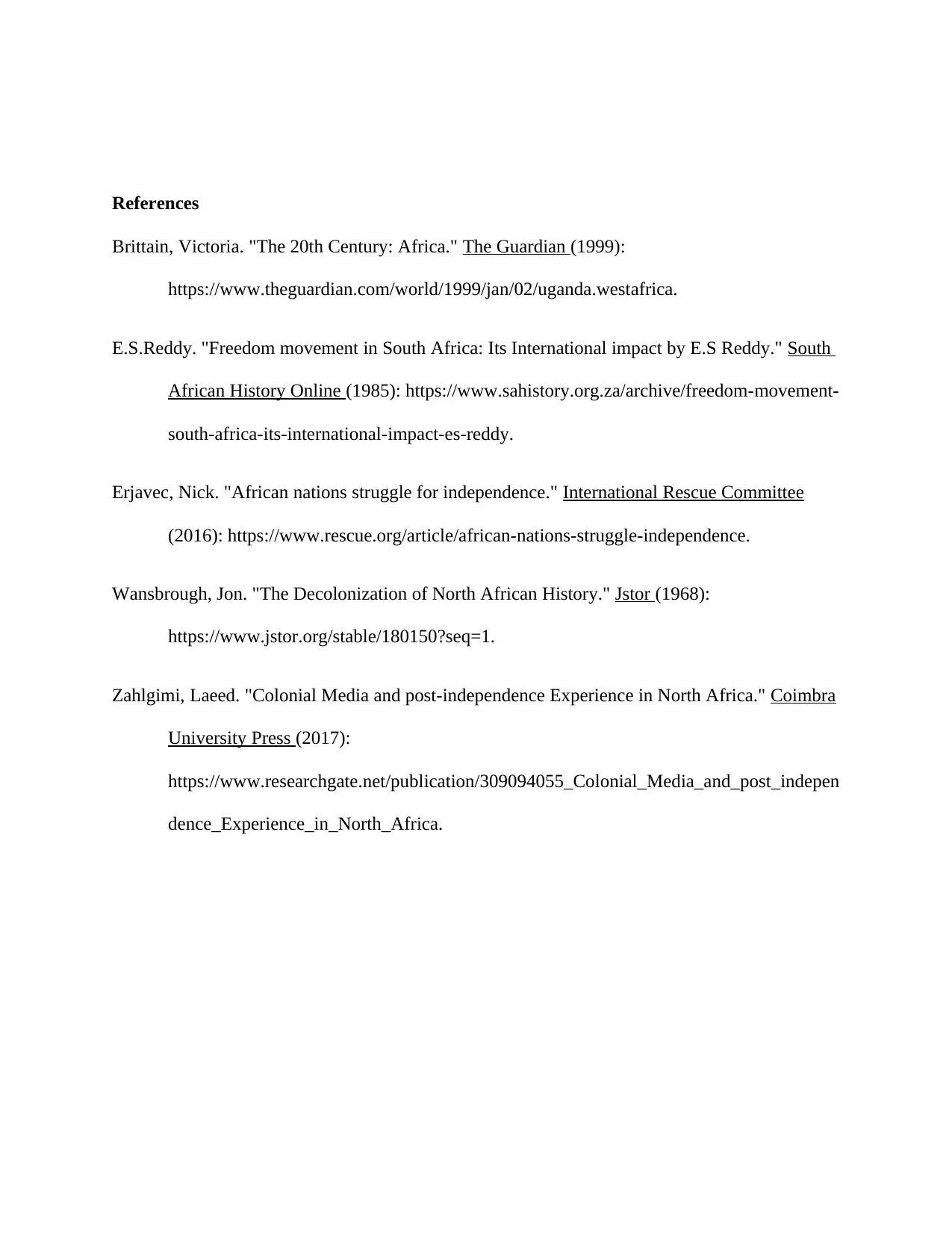African Nationalism: Stages of Liberation and Colonial Struggles
VerifiedAdded on 2022/09/15
|5
|952
|37
Essay
AI Summary
This essay analyzes the rise and evolution of African nationalism, focusing on the post-World War II era and the decolonization process. It examines the different stages of liberation struggles, including the emergence, coalescence, and bureaucratization phases, using examples from Gold Coast Ghana and North Africa. The essay contrasts the democratic struggles in East Africa with the more violent conflicts in North Africa, highlighting the roles of key leaders like Kwame Nkrumah and the impact of colonial powers. It also discusses the root causes of resentment, such as Apartheid and social anomie, and compares the stakes of the majority in different regions. The analysis includes references to historical events and sociological theories to provide a comprehensive understanding of the complexities of African nationalism and its fight for independence.

Paraphrase This Document
Need a fresh take? Get an instant paraphrase of this document with our AI Paraphraser

Rise of nationalism and its evolution in three stages of liberation struggle formed the crux
of independent Africa
Award-winning Documentary “Rise of the nationalism” by Basil Davidson starts on a positive
note when he introduces the era right after the second world war, this documentary captures the
economic growth of the gold coast of Ghana, during the initial years. Images of the felicitation of
Black soldiers who fought bravely appear in front of us. This section also shows some visuals of
black people performing in the mainstream economy with the white people (Erjavec). However,
the undertones of certain key events indicate the beginning stage of a social movement. The
theories of sociology identify this stage as the “Emergence phase.” In the case of Gold coast
Ghana, this Phase of emergence was the beginning of a Freedom struggle. At the same time
when we have a look at the freedom struggle which was taking place in the northern part of the
country, we find that it was more of a battle between two communities which sublimated into a
freedom struggle when the oppressed community revolted against a mighty oppressor
(Wansbrough).
In the case of Eastern Africa, we find the presence of strong leadership in the form of some
advocates of democracy. Leaders like Dr. Kwame Nkrumah paved the way for the next stage
of this freedom struggle which is Coalescence. Under stage coalescence, a certain section of
society demands equality in social status, mostly by the virtue of their majority. The freedom
struggle of Gold coast Ghana and many other countries in Eastern Africa presents an example of
a “democratic war, where the oppressors were in minority and the threshold of the Majority
forced them out of the corridors of power (Brittain).
of independent Africa
Award-winning Documentary “Rise of the nationalism” by Basil Davidson starts on a positive
note when he introduces the era right after the second world war, this documentary captures the
economic growth of the gold coast of Ghana, during the initial years. Images of the felicitation of
Black soldiers who fought bravely appear in front of us. This section also shows some visuals of
black people performing in the mainstream economy with the white people (Erjavec). However,
the undertones of certain key events indicate the beginning stage of a social movement. The
theories of sociology identify this stage as the “Emergence phase.” In the case of Gold coast
Ghana, this Phase of emergence was the beginning of a Freedom struggle. At the same time
when we have a look at the freedom struggle which was taking place in the northern part of the
country, we find that it was more of a battle between two communities which sublimated into a
freedom struggle when the oppressed community revolted against a mighty oppressor
(Wansbrough).
In the case of Eastern Africa, we find the presence of strong leadership in the form of some
advocates of democracy. Leaders like Dr. Kwame Nkrumah paved the way for the next stage
of this freedom struggle which is Coalescence. Under stage coalescence, a certain section of
society demands equality in social status, mostly by the virtue of their majority. The freedom
struggle of Gold coast Ghana and many other countries in Eastern Africa presents an example of
a “democratic war, where the oppressors were in minority and the threshold of the Majority
forced them out of the corridors of power (Brittain).

In the first stage of this freedom struggle, rebellion or the people in the majority demanded equal
rights under a system, later on when they realized that certain legislations are barring this
freedom the revolted against them, this gave rise to the third stage of the freedom struggle which
was Bureaucratization, in the year 1960, individuals living in Ghana finally won a battle when
the declared themselves independent (E.S.Reddy).
This freedom struggle was different from the freedom struggle that individuals were fighting in
North Africa. They were battling it out against the French armies and the nature of the struggle
was violent. In Northern Africa, the stage of emergence was very strong when organized attacks
were launched on civilian and military targets were launched. However, the next two stages of
this movement took the shape of an ongoing war between French colonizers. The second stage of
this freedom struggle can be marked with the operations carried out by the French colonizers to
curb the insurgency caused by the first onslaught of the rebellions. In the third step, the
rebellions adopted the tactics of guerrilla warfare to disturb the settlements of the colonial
powers (Zahlgimi). The Algerian war is a prominent example of this.
The countries of Africa faced two types of colonial powers; the powers ruling East Africa were
more interested in Imperialism. The French Colonists ruling the northern part of the country
were more trigger happy, they were trying to oppress the local people with the help of gun
culture. A violent revolt was the only solution in front of them.
While looking at the social history of the freedom struggles in Africa it is very important to
understand the root causes of the resentment of the local people. Most of the sociologists refer to
the policies of Apartheid and discrimination with the native people as the root causes. However,
a deep study of issues of Eastern Africa gives us an idea that social anomie was also developing
rights under a system, later on when they realized that certain legislations are barring this
freedom the revolted against them, this gave rise to the third stage of the freedom struggle which
was Bureaucratization, in the year 1960, individuals living in Ghana finally won a battle when
the declared themselves independent (E.S.Reddy).
This freedom struggle was different from the freedom struggle that individuals were fighting in
North Africa. They were battling it out against the French armies and the nature of the struggle
was violent. In Northern Africa, the stage of emergence was very strong when organized attacks
were launched on civilian and military targets were launched. However, the next two stages of
this movement took the shape of an ongoing war between French colonizers. The second stage of
this freedom struggle can be marked with the operations carried out by the French colonizers to
curb the insurgency caused by the first onslaught of the rebellions. In the third step, the
rebellions adopted the tactics of guerrilla warfare to disturb the settlements of the colonial
powers (Zahlgimi). The Algerian war is a prominent example of this.
The countries of Africa faced two types of colonial powers; the powers ruling East Africa were
more interested in Imperialism. The French Colonists ruling the northern part of the country
were more trigger happy, they were trying to oppress the local people with the help of gun
culture. A violent revolt was the only solution in front of them.
While looking at the social history of the freedom struggles in Africa it is very important to
understand the root causes of the resentment of the local people. Most of the sociologists refer to
the policies of Apartheid and discrimination with the native people as the root causes. However,
a deep study of issues of Eastern Africa gives us an idea that social anomie was also developing
⊘ This is a preview!⊘
Do you want full access?
Subscribe today to unlock all pages.

Trusted by 1+ million students worldwide

in a society where blacks were questioning about their inferior status in society. The essence of
any democratic lies in the realms of equal opportunities and equal rights, revolutionaries of
Eastern Africa revolted because they were demanding for an equal stake in the economic and
bureaucratic affairs of the society.
The northern part of Africa, on the other hand, was struggling against a cruel regime. Any
comparison between the freedom struggles of these two areas is incomplete without the mention
of the stakes of the majority. In the case of Eastern Africa, we can see that majority of the people
were belonging to the black community and the nature of the battle was democratic. In the case
of North America, it was a battle between the European settlers and the sons of the soil.
any democratic lies in the realms of equal opportunities and equal rights, revolutionaries of
Eastern Africa revolted because they were demanding for an equal stake in the economic and
bureaucratic affairs of the society.
The northern part of Africa, on the other hand, was struggling against a cruel regime. Any
comparison between the freedom struggles of these two areas is incomplete without the mention
of the stakes of the majority. In the case of Eastern Africa, we can see that majority of the people
were belonging to the black community and the nature of the battle was democratic. In the case
of North America, it was a battle between the European settlers and the sons of the soil.
Paraphrase This Document
Need a fresh take? Get an instant paraphrase of this document with our AI Paraphraser

References
Brittain, Victoria. "The 20th Century: Africa." The Guardian (1999):
https://www.theguardian.com/world/1999/jan/02/uganda.westafrica.
E.S.Reddy. "Freedom movement in South Africa: Its International impact by E.S Reddy." South
African History Online (1985): https://www.sahistory.org.za/archive/freedom-movement-
south-africa-its-international-impact-es-reddy.
Erjavec, Nick. "African nations struggle for independence." International Rescue Committee
(2016): https://www.rescue.org/article/african-nations-struggle-independence.
Wansbrough, Jon. "The Decolonization of North African History." Jstor (1968):
https://www.jstor.org/stable/180150?seq=1.
Zahlgimi, Laeed. "Colonial Media and post-independence Experience in North Africa." Coimbra
University Press (2017):
https://www.researchgate.net/publication/309094055_Colonial_Media_and_post_indepen
dence_Experience_in_North_Africa.
Brittain, Victoria. "The 20th Century: Africa." The Guardian (1999):
https://www.theguardian.com/world/1999/jan/02/uganda.westafrica.
E.S.Reddy. "Freedom movement in South Africa: Its International impact by E.S Reddy." South
African History Online (1985): https://www.sahistory.org.za/archive/freedom-movement-
south-africa-its-international-impact-es-reddy.
Erjavec, Nick. "African nations struggle for independence." International Rescue Committee
(2016): https://www.rescue.org/article/african-nations-struggle-independence.
Wansbrough, Jon. "The Decolonization of North African History." Jstor (1968):
https://www.jstor.org/stable/180150?seq=1.
Zahlgimi, Laeed. "Colonial Media and post-independence Experience in North Africa." Coimbra
University Press (2017):
https://www.researchgate.net/publication/309094055_Colonial_Media_and_post_indepen
dence_Experience_in_North_Africa.
1 out of 5
Your All-in-One AI-Powered Toolkit for Academic Success.
+13062052269
info@desklib.com
Available 24*7 on WhatsApp / Email
![[object Object]](/_next/static/media/star-bottom.7253800d.svg)
Unlock your academic potential
Copyright © 2020–2026 A2Z Services. All Rights Reserved. Developed and managed by ZUCOL.
